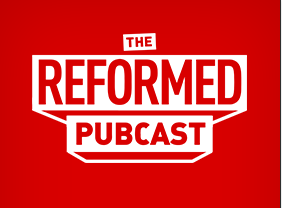Now, I see here today more people that I am accustomed to having at the sermon. Why is that? It is Christmas day. And who told you this? You poor beasts. That is a fitting euphemism for all of you who have . . . Continue reading →
September 2015 Archive
How Many Radical Muslims Are There In The World?
Heidelberg 124: Not My Will But Yours Be Done
One of the most striking moments in the gospels is our Lord’s prayer in Garden of Gethsemane (Matthew 26:36–46; Mark 14:32–42; Luke 22:39–46). For one thing, in those moments we are given compelling evidence of our Lord’s true humanity. This is not . . . Continue reading →
On The Reformed Pubcast Discussing Covenant Theology
Covenant theology is sometimes regarded and presented by American evangelicals as an idiosyncratic, mysterious, even esoteric way to read Scripture. Of course, from a historical and biblical perspective, it is nothing of the sort. Much of what the Reformed began to teach . . . Continue reading →
Grace And Consequences
I consider myself a “grace boy.” That is, all the debates that have been on-going in Presbyterian and Reformed circles over sanctification over the past few years, I side with those who emphasize the indicative (who we are by virtue of our . . . Continue reading →
Heidelberg 123: The Second Petition—Your Kingdom Come (2)
We have already seen some of the difficulties that come with both an over-realized and under-realized eschatology. In contrast to both we should see that the Gospel of Mark presents our Lord Jesus as proclaiming neither a fully realized, earthly kingdom nor . . . Continue reading →
Tradionalism Was Never Going To Hold
Many years before Obergefell, same-sex marriage activists accurately identified the underbelly of their opponents’ political and cultural position: Most support for “traditional marriage” was not based on a sophisticated and principled conviction, but rather the social intuition that supporting marriage-as-it-has-always-been was the . . . Continue reading →
The Cost Of Social Collapse
Heidelberg 123: The Second Petition—Your Kingdom Come (1)
What this all means is that how one understands the kingdom is very closely related to one’s eschatology. This is the often unspoken assumption behind the too-often heated debate over the kingdom in confessional Reformed circles. Most everyone in the contemporary intra-Reformed agrees that Christ is reigning now, that he is sovereign now, but the disagreement comes over the implications of that reign. We all agree that the kingdom has been inaugurated and that it has earthly manifestations but where we disagree is where to look for those manifestations. Since the late 19th century, those who have been influenced by what has come to be called “neo-Calvinism” (neo is Greek for new) have sometimes argued that Christ’s reign is such that the kingdom is manifested in everything than any Christian does for the sake of Christ. This is a more expansive way of speaking of the implications of the kingdom of God than was traditionally used. Those who take the narrower view, tend to associate the manifestation of the kingdom of God on the earth with the visible institutional church. Continue reading →
The Holy Catholic Church Or A Holy Catholic Church?
Recently I received a query about which English translation of the 9th article of the Apostles’ Creed is correct: “a holy catholic church” or the holy catholic church”? As far as I can tell the evidence is overwhelmingly on the side of . . . Continue reading →
Perkins On Churches And Sects
As for the assemblies of Anabaptists, Libertines, Antinomies, Tritheists, Arians, Samosatenians, they are no Churches of God, but conspiracies of monstrous heretics judicially condemned in the primitive Church, and again by the malice of Satan renewed and revived in this age. The . . . Continue reading →
Heidelberg Catechism 122: What It Means To Say “Hallowed Be Your Name”
Our familiarity with the Lord’s Prayer (Matthew 6:9–13) might give us the impression that it is rudimentary. It is not. Right at the outset we are confronted with a challenge. The first petition is not quite what we might think. There is . . . Continue reading →






